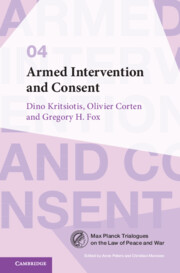35 results
1 - Intervention and the Problematisation of Consent
-
-
- Book:
- Armed Intervention and Consent
- Published online:
- 22 June 2023
- Print publication:
- 06 July 2023, pp 26-100
-
- Chapter
-
- You have access
- Open access
- HTML
- Export citation
Contents
-
- Book:
- Armed Intervention and Consent
- Published online:
- 22 June 2023
- Print publication:
- 06 July 2023, pp v-viii
-
- Chapter
-
- You have access
- Open access
- HTML
- Export citation
Copyright page
-
- Book:
- Armed Intervention and Consent
- Published online:
- 22 June 2023
- Print publication:
- 06 July 2023, pp iv-iv
-
- Chapter
-
- You have access
- Open access
- HTML
- Export citation
Index
-
- Book:
- Armed Intervention and Consent
- Published online:
- 22 June 2023
- Print publication:
- 06 July 2023, pp 331-338
-
- Chapter
-
- You have access
- Open access
- HTML
- Export citation
Appendix II - Cases of Intervention by Invitation, 1990–2017
- from 3 - Invitations to Intervene after the Cold War
-
- Book:
- Armed Intervention and Consent
- Published online:
- 22 June 2023
- Print publication:
- 06 July 2023, pp 277-318
-
- Chapter
-
- You have access
- Open access
- HTML
- Export citation
Appendix I - Coding Manual
- from 3 - Invitations to Intervene after the Cold War
-
- Book:
- Armed Intervention and Consent
- Published online:
- 22 June 2023
- Print publication:
- 06 July 2023, pp 270-276
-
- Chapter
-
- You have access
- Open access
- HTML
- Export citation
Preface
-
- Book:
- Armed Intervention and Consent
- Published online:
- 22 June 2023
- Print publication:
- 06 July 2023, pp ix-xii
-
- Chapter
-
- You have access
- Open access
- HTML
- Export citation

Armed Intervention and Consent
-
- Published online:
- 22 June 2023
- Print publication:
- 06 July 2023
-
- Book
-
- You have access
- Open access
- Export citation
8 - Intervention: Sketches from the Scenes of the Mexican and Russian Revolutions
- from Part III - Intervention
-
-
- Book:
- Revolutions in International Law
- Published online:
- 21 January 2021
- Print publication:
- 18 February 2021, pp 183-217
-
- Chapter
- Export citation
3 - The Elusive Peace of Panmunjom
- from Part I - The Anti-linear Cold War
-
-
- Book:
- International Law and the Cold War
- Published online:
- 05 December 2019
- Print publication:
- 19 December 2019, pp 49-78
-
- Chapter
- Export citation
Part III - Final Reflections
-
- Book:
- Conceptual and Contextual Perspectives on the Modern Law of Treaties
- Published online:
- 19 October 2018
- Print publication:
- 25 October 2018, pp 1005-1099
-
- Chapter
- Export citation
Contents
-
- Book:
- Conceptual and Contextual Perspectives on the Modern Law of Treaties
- Published online:
- 19 October 2018
- Print publication:
- 25 October 2018, pp v-vii
-
- Chapter
- Export citation
9 - The Object and Purpose of a Treaty’s Object and Purpose
- from Part I - Conceptual Perspectives
-
-
- Book:
- Conceptual and Contextual Perspectives on the Modern Law of Treaties
- Published online:
- 19 October 2018
- Print publication:
- 25 October 2018, pp 237-302
-
- Chapter
- Export citation
Foreword
-
- Book:
- Conceptual and Contextual Perspectives on the Modern Law of Treaties
- Published online:
- 19 October 2018
- Print publication:
- 25 October 2018, pp xiii-xvi
-
- Chapter
- Export citation
Contributors
-
- Book:
- Conceptual and Contextual Perspectives on the Modern Law of Treaties
- Published online:
- 19 October 2018
- Print publication:
- 25 October 2018, pp viii-xii
-
- Chapter
- Export citation
Part II - Contextual Perspectives
-
- Book:
- Conceptual and Contextual Perspectives on the Modern Law of Treaties
- Published online:
- 19 October 2018
- Print publication:
- 25 October 2018, pp 507-1004
-
- Chapter
- Export citation
1 - Introduction: The Interplay of Concept, Context and Content in the Modern Law of Treaties
-
-
- Book:
- Conceptual and Contextual Perspectives on the Modern Law of Treaties
- Published online:
- 19 October 2018
- Print publication:
- 25 October 2018, pp 1-21
-
- Chapter
- Export citation
Index
-
- Book:
- Conceptual and Contextual Perspectives on the Modern Law of Treaties
- Published online:
- 19 October 2018
- Print publication:
- 25 October 2018, pp 1100-1146
-
- Chapter
- Export citation
Copyright page
-
- Book:
- Conceptual and Contextual Perspectives on the Modern Law of Treaties
- Published online:
- 19 October 2018
- Print publication:
- 25 October 2018, pp iv-iv
-
- Chapter
- Export citation
Part I - Conceptual Perspectives
-
- Book:
- Conceptual and Contextual Perspectives on the Modern Law of Treaties
- Published online:
- 19 October 2018
- Print publication:
- 25 October 2018, pp 77-506
-
- Chapter
- Export citation

